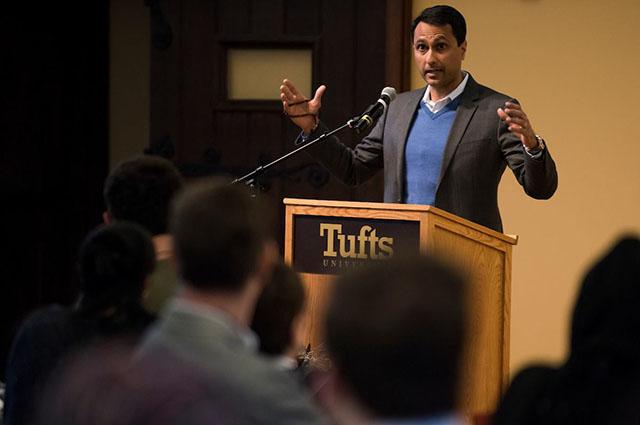Eboo Patel Discusses Connections between Interfaith Work and Civic Life

On April 1st, Tisch College was proud to join the Tufts University Chaplaincy in presenting the 2019 Russell Lecture on Spiritual Life, which was delivered by author, educator, and activist Eboo Patel. As the founder and president of Interfaith Youth Core, Patel has made tremendous contributions to interfaith dialogue and cooperation. He served on President Barack Obama’s inaugural Advisory Council on Faith-Based Neighborhood Partnerships, and he was recently selected as one of five future policy leaders to watch by Harvard University's Kennedy School Review.
One of Patel’s five books, Acts of Faith: The Story of an American Muslim, in the Struggle for the Soul of a Generation, was selected as the 2015 common reading book for Tufts University undergraduates as part of a program spearheaded by Tisch College and by the Office of the Dean of Undergraduate and Graduate Students.
After opening remarks from the University Chaplain, Rev. Greg McGonigle, and several other Tufts chaplains, Patel delivered a lecture titled “Division or Unity: Religious Diversity and the American Promise,” which highlighted the integral role of religious communities in American society.
He began by sharing a recent experience at the Greater Chicago Food Depository, the city’s food bank. The CEO told him: “We have 650 distribution sites across the Chicago-area ... and of those 650 sites, at least 450 are faith centers–churches, synagogues, and mosques. We have some 10,000 volunteers every year ... and at least two-thirds volunteer here with their religious communities.
“And you can actually watch this happening,” Patel continued. “If you stand on a balcony above the warehouse on a Sunday afternoon, you’ll see six or seven different faith communities walk in.”
Patel shared this and other anecdotes of service and civic engagement as evidence of the concrete, positive social impact of communities of faith in American life. “I was reading about some terrible floods in Nebraska, guess who was going door-to-door, draining water? Religious communities,” he said.
Patel likewise highlighted the historic ties between religious institutions and other vital institutions in American society, like higher education.
“There’s 20,804 residential colleges and universities in the United States. Catholics built about a tenth of them. Methodists have built about a hundred: from Duke and Emory, to Syracuse and USC,” said Patel. Tufts University was itself established by Universalists in 1852.
For Patel, effective interfaith collaboration is a natural and critical next step for religious communities that wish to build on and expand their impact on civic life in an increasingly diverse country.
“At every school, every hospital, every social service agency, every recreational facility, religious diversity is becoming more and more a feature of American civic spaces. Do we not think that we are going to need professionals who are able to lean positively into that dimension of diversity? To increase social capital? To reduce prejudice? To create a larger sense of we?”
After his lecture, Patel answered questions from the audience about how to approach conflict between religious communities, how to grapple with religious doubt, and what the increasing secularization of some segments of American society may mean for the nation’s civic life.